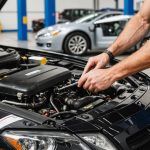In today’s world, where environmental consciousness is on the rise, reducing your carbon footprint while maximizing fuel efficiency has become a priority for many. Whether you’re driving a gas-powered vehicle or exploring electric alternatives, embracing eco-friendly practices can significantly lower your emissions and fuel costs. This article delves into effective strategies to harmonize your driving habits with a sustainable lifestyle, offering practical insights for the everyday driver. Join us as we navigate the path to more economical and environmentally-conscious transportation.
Understand Your Vehicle’s Fuel Efficiency
Every vehicle has its own fuel efficiency characteristics, and understanding how your car operates is the first step to driving economically. Fuel efficiency isn’t just about the type of energy your vehicle uses but also how you use it.
In the same genre : How do you check your vehicle’s oil level accurately and why is it important?
Knowing Your Car
Understanding your vehicle’s fuel efficiency starts with knowing its capabilities and limitations. Check your car’s manual to find out the recommended maintenance schedule, including oil changes, tire rotations, and air filter replacements. Regular maintenance ensures your vehicle runs at its peak efficiency.
Efficient Use of Fuel
- Smart Acceleration: Sudden starts and rapid acceleration can increase fuel consumption. Instead, opt for gradual acceleration, which is more energy-efficient.
- Speed Matters: Driving at higher speeds can significantly reduce fuel efficiency. Try to maintain a consistent speed, ideally between 45-60 mph, which is typically the most fuel-efficient range for most vehicles.
Weighing Load and Aerodynamics
- Remove Unnecessary Weight: Extra weight can decrease your car’s fuel efficiency. Clear out your trunk and back seat of unnecessary items.
- Enhance Aerodynamics: Keeping windows closed on highways and using air conditioning sparingly can improve your vehicle’s aerodynamic performance, thus saving fuel.
Understanding how to make your car work it’s most efficiently is vital in reducing your carbon footprint and saving on fuel costs.
Also to read : What role does regular car servicing play in maintaining your vehicle’s warranty?
Embrace Eco-Friendly Driving Habits
Eco-friendly driving habits not only help reduce your carbon emissions but also maximize your vehicle’s fuel efficiency. Small adjustments in how you drive can yield substantial environmental benefits.
Anticipate Traffic
Planning your route to avoid traffic congestion can be a game-changer for fuel efficiency. Utilize GPS navigation systems to find the most efficient path to your destination, saving both time and fuel.
Utilize Cruise Control
When driving on highways, using cruise control can help maintain a steady speed, reducing unnecessary fuel consumption. This simple feature can be your best ally on long drives.
Proper Tire Inflation
Tires that are not properly inflated can lead to increased fuel consumption. Regularly check your tire pressure, as even a slight decrease can reduce fuel efficiency by up to 3%. Ensure your tires are inflated to the manufacturer’s recommended levels.
Minimize Idling
Long periods of idling waste fuel and increase emissions. Turn off your engine if you’re stopped for more than a minute. Modern engines are designed to be efficient even with frequent stops and starts.
Eco-friendly driving isn’t just about reducing your carbon footprint; it’s about adopting a lifestyle that aligns with the principles of sustainability and responsibility.
Consider Alternative Energy Vehicles
The evolution of transportation has introduced alternative energy vehicles as a viable option for reducing carbon footprints. Whether it’s a fully electric vehicle or a hybrid, making the switch can significantly impact your environmental footprint.
The Appeal of Electric Vehicles
Electric vehicles (EVs) operate on stored electrical energy, eliminating the need for gasoline and thus reducing carbon emissions.
- Zero Tailpipe Emissions: EVs are celebrated for their minimal environmental impact as they produce no tailpipe emissions, contributing significantly to a cleaner atmosphere.
- Cost Efficiency: While the initial investment may be higher, EVs offer lower operating costs due to reduced fuel expenses and maintenance requirements.
Hybrid Vehicles: A Balanced Approach
For those not ready to fully transition to electric, hybrid vehicles offer a compelling compromise. Hybrids use a combination of gasoline engines and electric motors to enhance fuel efficiency.
- Regenerative Braking: This technology allows hybrids to recover energy usually lost during braking, using it to recharge the battery.
- Versatility: Hybrids provide the flexibility of using traditional fuel while enjoying the benefits of electric efficiency.
Exploring these alternative energy vehicles can be a significant step toward sustainable living, offering both environmental benefits and improved efficiency.
Maintain Your Vehicle for Optimal Performance
Consistent maintenance is key to ensuring your vehicle runs efficiently and with minimal environmental impact. A well-maintained car not only lasts longer but also operates more efficiently, helping you save on fuel costs.
Routine Checks
Regularly scheduled maintenance checks are essential for optimal car performance. This includes:
- Oil Changes: Use the recommended grade of motor oil for your car. Regular oil changes keep the engine running smoothly, reducing friction and improving fuel economy.
- Air Filter Replacements: A clean air filter ensures that your engine gets the oxygen it needs for combustion, leading to better fuel efficiency.
Efficient Cooling Systems
A properly functioning cooling system prevents your vehicle from overheating, which can otherwise lead to decreased efficiency and increased emissions.
- Radiator Maintenance: Regularly check your coolant levels and radiator condition to prevent overheating.
- Thermostat Checks: Ensure the thermostat is working correctly to optimize engine temperature for fuel efficiency.
Professional Tune-Ups
Periodic professional tune-ups can catch issues before they become significant problems. Technicians can adjust your timing and spark plugs, ensuring your vehicle operates at its best.
Consistent, proactive maintenance is a cornerstone of responsible vehicle ownership, crucial for maintaining an eco-friendly and economically efficient vehicle.
In our pursuit of a more sustainable future, adopting strategies to drive economically and reduce your carbon footprint is more crucial than ever. By understanding your vehicle’s fuel efficiency, embracing eco-friendly driving habits, exploring alternative energy vehicles, and committing to regular maintenance, we can collectively contribute to a cleaner, greener planet. These practices not only benefit the environment but also lead to energy and cost savings for individuals. Together, we can make a significant impact, one journey at a time.











